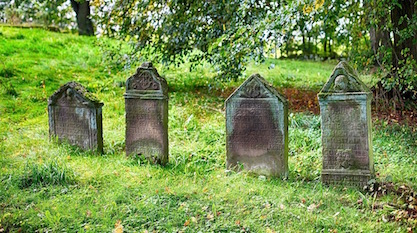 Culture & Ethics
Culture & Ethics
A New Low for Evolutionary Ethics


Our colleague Wesley Smith has found an article at Big Think that is fascinating, and revolting, arguably going as low as we’ve seen before, at least in mainstream Western media, in exploring the limits of what’s permitted by evolutionary ethics. Wesley has a stronger stomach than I do and so he discusses it frankly over at National Review Online. Without going into more detail myself, the thesis advanced by ethicist Tauriq Moosa has to do with how we expect human beings to respect the bodies of their fellows who have passed away.
I’m sorry if it sounds like I’m being coy. I hesitate about even covering this due to the sheer tastelessness of the topic. But it’s important to see where a certain line of thinking ultimately issues.
Understand that Big Think is not an obscure web journal by and for a lunatic fringe. On the contrary, we’ve called attention to writing and videos there in the past, featuring well-known, indeed respected names like Francis Collins and Bill Nye. The highlighted “experts” on the front page at the moment are led by journalist Gay Talese, University College London neuroscientist Tali Sharot, and activist Van Jones.
Not surprisingly, Moosa justifies the unspeakable in terms of a denial of humanity’s exceptional status in nature:
The major problem is that almost all arguments about respect for the dead tend to be extrapolations from the idea of humans as some kind of cosmic or metaphysically “special” beings: that is, humans are, by definition, sacred because of some relation to elements or entities that transcend our everyday existence. This is usually a god or something equally important to many people. There are few reasons to think such supernaturally and cosmically important entities even exist, so naturally there will be little reason to think their relations with us true.
Indeed, untying ideas of sanctity from assertions of divinely-ordained anthropocentrism is, I think, impossible. And there is little reason to think humans are cosmically special, since there are few arguments that are not merely circular, theological pap.
In an essay elsewhere, published by the Institute for Science and Human Values and co-written with philosopher Darragh Hare, Moosa explains that denying human exceptionalism is simply an extension of evolutionary thinking.
A common attitude is that humans, as the purported pinnacle of evolution, have certain capacities that set them apart from all other species. If true, this could very well serve as a justification for the human-natural distinction. But do humans really occupy this privileged position? Are we really that special? It is true that humans have some very advanced capacities, and we can manipulate the world around us to great effect. But there are other capacities which are very poor in humans compared to other species, and others which we lack entirely. How good are humans at identifying individual molecules in the air by smell, breathing unassisted under water or navigating using the Earth’s electrical field? Moreover, the capacities which are well-developed in humans, for example language, cooperation, building complex structures, and hunting with weapons, are not uniquely human — they are all observable to some degree in other species. There are no categorical distinctions between the capacities of humans and those of other species — merely evolutionary gradients. The human-natural distinction is unsupportable on these grounds.
He’s right that the “human-natural distinction is unsupportable on [evolutionary] grounds.” Seen in the light of Darwinism, humans are merely an undistinguished part of nature. Frankly, given Moosa’s premise, it’s hard to argue against his shredding of basic ethical norms, the most fundamental human decency.
His point is that people stand out from other animals in some respects — e.g., we’re brainier — while in different ways, other animals species outdo us by far. You and I can do math problems, or play a musical instrument. More than that, humans discover mathematical truths, and create profoundly beautiful music. A cheetah can never do any of those things. On the other hand, we can’t run 70 miles per hour like a cheetah may do. Who’s to say that what makes us special is more special, more favored by the universe and therefore more “supportable” as evidence of a unique place in the cosmos, than what makes a cheetah special?
Nothing in evolutionary ethics can identify a flag or marker on human beings that sets us apart as possessing a special dignity. Religious tradition can do so, but that is dismissed by Moosa as “merely circular, theological pap.”
Without entering into a discussion of his snide accusation, the observation of intelligent design in nature is an objective indication that what makes people special makes us uniquely special in the universe, in a different category altogether from cheetahs and all other creatures. Why?
A designer standing behind biology and cosmology is necessarily understood as having two characteristics: intelligence and creativity, without which no design is possible in any context we know about. A designer exercises intelligence and creativity by definition. These are also the characteristics that set human beings apart from the rest of the living world. A cheetah runs at high speeds, and that is impressive. But running fast is not something we assume that an intelligent designer must be able to do.
It seems that if nature reflects purpose and design, then there is something uniquely favored about humans, because we in turn reflect the nature, the image, of the intelligent agent that chose to instantiate that design. Our physical body, even if incapacitated, even if no longer alive, is the unique vehicle chosen for the designer’s image. The body is thus worthy of extraordinary respect.
That realization is an inference from objective science. As the case of Tauriq Moosa suggests, it’s also a bulwark against moral horror.
Photo credit: Momentmal, via Pixabay.
